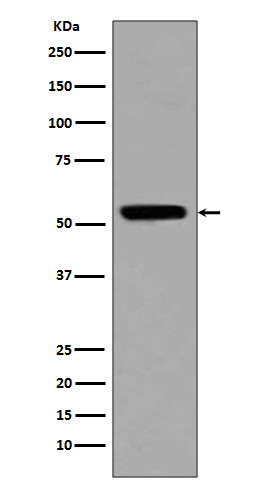
| WB | 咨询技术 | Human,Mouse,Rat |
| IF | 1/20 | Human,Mouse,Rat |
| IHC | 咨询技术 | Human,Mouse,Rat |
| ICC | 1/50-1/200 | Human,Mouse,Rat |
| FCM | 咨询技术 | Human,Mouse,Rat |
| Elisa | 咨询技术 | Human,Mouse,Rat |
| Aliases | Antigen NY-CO-13; Cellular tumor antigen p53; Phosphoprotein p53; TP53; Tumor suppressor p53 |
| Entrez GeneID | 7157 |
| WB Predicted band size | Calculated MW: 44 kDa; Observed MW: 53 kDa |
| Host/Isotype | Rabbit IgG |
| Antibody Type | Primary antibody |
| Storage | Store at 4°C short term. Aliquot and store at -20°C long term. Avoid freeze/thaw cycles. |
| Species Reactivity | Human,Mouse,Rat |
| Immunogen | A synthesized peptide derived from human p53 (acetyl K370) |
| Formulation | Purified antibody in PBS with 0.05% sodium azide. |
+ +
以下是关于Acetyl-p53 (Lys370)抗体的3篇参考文献的简要总结:
1. **"Acetylation of p53 at lysine 370 is required for apoptosis and cell cycle arrest"**
- **作者**: Luo, J. et al.
- **摘要**: 研究证明Lys370位点的乙酰化是p53介导的DNA损伤后细胞周期阻滞和凋亡的关键修饰。通过特异性抗体检测发现,乙酰化增强了p53与靶基因启动子的结合能力,促进下游基因(如p21和Bax)的转录激活。
2. **"Regulation of p53 activity by lysine 370 acetylation"**
- **作者**: Gu, W. & Roeder, R.G.
- **摘要**: 该文献揭示了p300/CBP介导的Lys370乙酰化通过拮抗MDM2介导的泛素化降解来稳定p53蛋白。利用Acetyl-p53 (Lys370)抗体验证了乙酰化在肿瘤细胞中对p53蛋白水平及活性的调控作用。
3. **"HDAC inhibitors enhance acetylation of p53 at lysine 370 and synergize with chemotherapy"**
- **作者**: Tang, Y. et al.
- **摘要**: 研究发现组蛋白去乙酰化酶抑制剂(HDACi)可特异性诱导p53在Lys370位点的乙酰化(通过Western blot验证),增强化疗药物对肺癌细胞的杀伤效果,提示该修饰可能作为癌症治疗的生物标志物。
以上文献均通过Acetyl-p53 (Lys370)抗体在实验中检测该位点的翻译后修饰,并探讨其在p53功能调控中的生物学意义。
The Acetyl-p53 (Lys370) antibody is a specialized tool used to study post-translational modifications of the tumor suppressor protein p53. a critical regulator of cell cycle arrest, DNA repair, and apoptosis. p53 becomes activated in response to cellular stress, such as DNA damage, and its activity is tightly controlled by modifications including phosphorylation, ubiquitination, and acetylation. Acetylation of p53 at lysine 370 (K370) is a key regulatory event mediated by histone acetyltransferases (HATs) like p300/CBP, which enhance p53's transcriptional activity by promoting chromatin relaxation and co-activator recruitment. This modification stabilizes p53 by reducing its interaction with the negative regulator MDM2 and enhances its ability to bind target gene promoters.
The Acetyl-p53 (K370) antibody specifically detects p53 acetylated at this residue, enabling researchers to investigate the activation status and functional regulation of p53 in various contexts, including cancer, where p53 mutations or dysregulated acetylation are common. It is widely used in techniques like Western blotting, immunoprecipitation, and immunofluorescence to study DNA damage responses, epigenetic regulation, and therapeutic interventions targeting p53 pathways. By focusing on K370 acetylation, this antibody provides insights into how post-translational modifications fine-tune p53's tumor-suppressive functions, offering a valuable tool for understanding cancer biology and developing precision therapies.
×